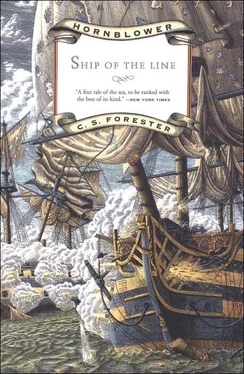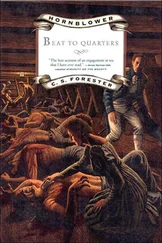“All well?” said Hornblower.
“Aye,” said Laird, and then, grudgingly, “come up and see for yourself.”
Hornblower got off his horse and scrambled up the rock, balancing precariously on its slippery summit beside the major.
“Ye’ll observe,” said Laird, academically, and rolling his r’s, “the formed troops must keep to the paths in this terrain. Moreover, detached skirmishers lose their sense of direction rapidly, and this thorny vegetation is admirably adapted to hinder free movement.”
From the rock Hornblower looked down upon a sea of green—the nearly impenetrable maquis which clothes the stony hillsides of Mediterranean Spain—through which the red coats of the marines, shoulder deep in the scrub, were hardly visible. Here and there puffs of white smoke, drifting over the surface, marked where recently there had been firing. On the opposite hillside there were other puffs of smoke and faint stirrings among the undergrowth. Hornblower saw white faces, and blue coats, and sometimes even white breeches over there where the French struggled through the thorny scrub. Much farther back he could see part of a column of troops waiting on a section of the path. Two or three musket bullets came whizzing through the air close over his head.
“We are quite safe here,” said Laird, “until the enemy turns our flank. If ye look over there to the right, ye’ll observe a French regiment advancing along a path roughly parallel to this one. As soon as it reaches that thorn tree there, we shall have to retreat and take up a fresh position and leave them all their work to do again. Fortunately that path is only a sheep track of uncertain direction. It may never reach that thorn tree.”
Hornblower could see a long line of French shakos bobbing along above the maquis as he followed Laird’s pointing finger; its loops and winds showed that the path must be, as Laird had suggested, a mere chance sheep track. Another bullet buzzed past them.
“The French standard of musketry,” said Laird, “is lower now even than it was at Maida, where I had the honour of being engaged as an officer on Sir John Stuart’s staff. Those fellows have been firing at me for half an hour now without hitting me, nor even the remotest chance of hitting me. But with two of us up here the possibility is doubled. I would recommend you sir, to descend and devote your attention to accelerating the march of the convoy.”
They looked at each other keenly. Hornblower knew quite well that the command of the rearguard was Laird’s duty, in which he should not interfere as long as it was properly performed. It was the fear of being thought afraid which made him hesitate to descend. As he stood, he felt his cocked hat struck a violent blow which twisted it on his head so that it toppled off; with an instinctive grab he caught it as it fell.
“That outflanking column,” said Laird, steadily, “is about to reach that thorn tree. I must ask you officially, sir”—he dragged out the long word into ‘offeeecially’—“to go back before I call on my men to retreat. Our retirement will necessarily be hurried.”
“Very well, major,” said Hornblower, grinning despite himself, and slipping down from the rock with all the dignity he could muster. He got on his horse and trotted down the path again; he examined his hat with a little thrill of pride to see that the bullet had hit the gold loop at the front, passing within two inches of his head, and he had felt no fear. Where the path crossed the summit of the next ridge he drew rein again; the musketry in the rear had suddenly become more intense. He waited, and then a detachment of marines came running along the path with Captain Morris at their head. They had no attention to spare for him as they turned aside and plunged into the undergrowth on either side of the path seeking points of vantage from which their fire would cover the retreat of their comrades. The musketry fire spluttered out abruptly, and then up the path they came, Laird at their head, half a dozen men under a young lieutenant bringing up the rear and turning to keep back the nearest enemy with warning shots.
Confident that the rearguard was under efficient direction, Hornblower was able to ride on to where the rearmost gun was standing stubbornly at the foot of a slope. The weary horses were plunging and slipping on the rocky surface as they strove to drag the thing up under the urgings of the sailors, but now there were only half a dozen seamen in place of the fifty Spaniards who had helped to drag it from the beach. They were reduced to heaving the gun up the slope foot by foot with crowbars; their naked ribs—most of them had thrown off their shirts—were glistening with sweat. Hornblower racked his brains for the appropriate thing to say.
“Heave away, my lads. Boney hasn’t any guns as good as these. Don’t let the Dagoes give him a birthday present.”
The column of Spaniards could now be seen like a long worm ascending the precipitous sides of the mesa. They had made their escape. Hornblower, looking after them felt a sudden feeling of hatred for them and the race they represented. They were a proud nation, yet never so proud as to disdain favours from others, hating foreigners only a little more than they hated each other, ignorant, misgoverned, misusing the wealth with which nature had endowed their country; Spain was a natural prey to any stronger nation. France had made this attempt at conquest, and it was only England’s jealousy which was defeating it. Some time in the future the country would be torn to pieces in the strife between Liberals and Conservatives, and at some period in that struggle the European powers would find sufficient accord to seize upon the fragments. Civil war and foreign aggression, centuries of them, perhaps constituted the future of Spain unless the Spaniards set their house in order.
He brought back his mind with an effort from profitless speculation on the future to deal with the petty problems in hand—detailing the returning mule teams to assist in dragging the guns, portioning out the failing strength of his men so as to make the best speed with the mass of material yet remaining; the spluttering musketry to the rear told how men were suffering wounds and death for the sake of preserving it from the enemy. He sternly cast out the doubt which assailed him as to whether the gesture were worth the price, and kicked his exhausted horse into a last effort as he clattered along the path.
Half the guns were on the beach at last—for the final run down the steep gully to the sand little exertion was needed—and the remainder were fast nearing the head of the gully. The beach was cleared of all the stores that had been landed, and the first gun was even now being dragged along the landing pier for transfer to the ships. Cavendish, in command at the beach, came up to Hornblower.
“What about the horses and mules, sir?”
Shipping a hundred and fifty animals would be as difficult a task as shipping the guns, and they would be an intolerable nuisance on board. Certainly they must not be allowed to fall into the hands of the French; in Spain at the present time they were the most valuable form of booty. The sensible thing to do would be to cut the brutes’ throats on the beach. Yet they were enormously valuable. If only they could be got away, and kept alive on board for a few days, they might be landed again and handed back to the Spaniards. To slaughter the wretched beasts would have as bad a moral effect on the men as losing the guns. Crushed biscuit would feed them on board—from the look of them it would be better fare than they had experienced for some time—and the fresh water problem was hardly insurmountable. In the rear Laird was still fighting his successful rearguard action, and the sun was fast setting over the mesa.
Читать дальше









